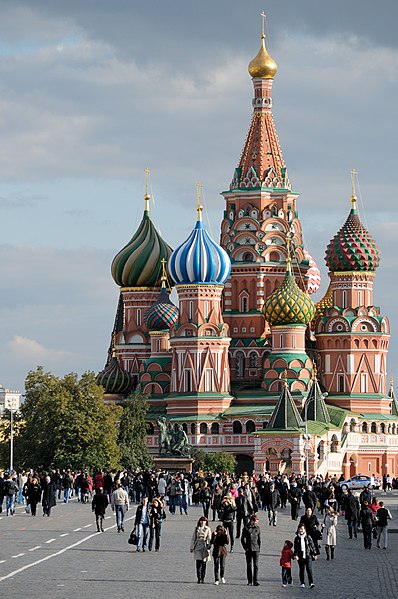Adopting from Russia
Contents
Russia Adoption Alert
Alert: Post-Placement reports (June 25, 2013)
Russia requires post-placement reports to provide information regarding the welfare of children adopted by U.S. families. Reports should be prepared in accordance with the requirements established by the Russian government and as agreed to during the adoption process. All reports should be translated into Russian. Reports may be submitted to the Ministry of Education and Science of the Russian Federation directly at the address included below or can be sent to the regional authorities where the adoption was completed. More information regarding post-placement reports can be found on the Russia country information sheet.
Ministry of Education and Science of the Russian Federation
Department of State Policy for the Protection of Children’s Rights 51 Lysinovskaya St. Moscow, 115998
We strongly urge you to comply with the requirements established by the Russia government and complete all post-adoption requirements in a timely manner. Your adoption agency may be able to help you with this process.
Alert: Russian Supreme Court Letter on Implementation of Federal Law No. 272-FZ (January 24, 2013)
On December 28, 2012, President Vladimir Putin signed into law Federal Law No. 272-FZ. This law went into effect on January 1, 2013. It bans the adoption of Russian children by U.S. citizens, bars adoption service providers from assisting U.S. citizens in adopting Russian children, and requires termination of the U.S.-Russia Adoption Agreement.
On January 22, the Deputy Chairman of the Russian Supreme Court issued a letter to city and regional courts explaining the implementation of Federal Law No. 272-FZ. The letter states that for adoption cases in which court decisions involving U.S. citizen parents were made before January 1, 2013, (including those that entered into force after January 1, 2013 following the 30-day waiting period), the children should be transferred to the custody of their adoptive parents. [Note: the original letter in Russian can be found athttp://www.supcourt.ru/Show_pdf.php?Id=8403; an unofficial English translation is available at this website.
We understand that several U.S. families have already obtained final adoption decrees in accordance with this guidance. The Department of State continues to strongly encourage U.S. families, in cooperation with their adoption service providers, to seek confirmation from Russian authorities that their adoptions will be processed to conclusion, prior to traveling to Russia.
The United States continues to urge the Russian government to allow all U.S. families who were in the process of adopting a child from Russia prior to January 1 to complete their adoptions so that these children may join permanent, loving families. U.S. Citizenship and Immigration Services and the Consular Section at the U.S. Embassy in Moscow continue to process Forms I-600, Petition to Classify Orphan as an Immediate Relative, and immigrant visa applications for children whose families have obtained all required documents as part of the adoption process.
U.S. families in the process of adopting a child from Russia may continue to contact the Office of Children's Issues at RussiaAdoption@state.gov. The Office of Children's Issues will reach out directly to families as additional information becomes available. Further information regarding intercountry adoption from Russia will also be posted on www.adoption.state.gov.
Hague Convention Information
Russia is not party to the Hague Convention on Protection of Children and Co-operation in Respect of Intercountry Adoption (Hague Adoption Convention). Intercountry adoptions of children from non-Hague countries are processed in accordance with 8 Code of Federal Regulations, Section 204.3 as it relates to orphans as defined under the Immigration and Nationality Act, Section 101(b)(1)(F).
Russian Federal law No 272-FZ remains in place banning the adoption of Russian children by U.S. citizens.
This law entered into force on January 1, 2013. It bans the adoption of Russian children by U.S. citizens, bars adoption service providers from assisting U.S. citizens in adopting Russian children, and required termination of the 2012 U.S.-Russia Adoption Agreement. The Russian Supreme Court issued a letter to city and regional courts on January 22, 2013 explaining the implementation of Federal Law No. 272-FZ. The letter states that only in those adoption cases in which court decisions involving U.S. citizen parents were made before January 1, 2013, (including those that entered into force after January 1, 2013 following the 30-day waiting period), may the children be transferred to the custody of their adoptive parents. The U.S.-Russia Adoption Agreement was terminated on January 1, 2014.
Additionally, on July 2, 2013 Russian Federal Law No. 167-FZ entered into force banning the adoption, custody, or patronage of children by same-sex couples and also to singles living in countries where same-sex marriage is allowed.
AFTER ADOPTION
The Government of Russia requires children adopted from Russia to be registered with either the Russian Ministry of Foreign Affairs (MFA) before they leave Russia or with the Russian Embassy or Consulate once they return to the United States.
Russia requires post-adoption reports to provide information regarding the welfare of children adopted by U.S. families. The initial post-placement report is due six months after the court decision granting adoption goes into effect. The second report is due six months after the first report but no later than 12 months after the court decision. The third report is due at 24 months and the fourth at 36 months. Reports should be prepared in accordance with the requirements established by the Russian government and as agreed to during the adoption process. All reports should be translated into Russian. Reports may be submitted either to the Ministry of Education and Science at the address included below or to the regional authorities where the adoption was completed.
Ministry of Education and Science of the Russian Federation
Department of State Policy for the Protection of Children’s Rights 51 Lysinovskaya St. Moscow, 115998
We strongly urge you to comply with Russia’s post-adoption requirements in a timely manner. Your adoption agency may be able to help you with this process. Your cooperation will contribute to the history of positive experiences with American parents.
Who Can Adopt
N/A
Residency
N/A
Age of Adopting Parents
N/A
Marriage
N/A
Income
N/A
Other
N/A
Who Can Be Adopted
N/A
How to Adopt
N/A
Adoption Authority
N/A
The Process
N/A
Traveling Abroad
N/A
After Adoption
N/A
Contact Information
U.S. Embassy in Russia
21 Novinsky Blvd. Moscow, Russia 123242 Tel: 728-5000 switchboard 728-5567 (orphan visas) Fax: 728-5247 (orphans only) Internet: U.S. Embassy in Russia
Russia’s Adoption Authority
Ministry of Education and Science of the Russian Federation Department of State Policy for the Protection of Children’s Right 51 Lysinovskaya St. Moscow, 115998
Embassy of the Russian Federation
2650 Wisconsin Avenue, N.W. Washington, D.C. 20007 Tel: 202-298-5700 Fax: 202-298-5735 Internet: Embassy of the Russian Federation
Russia also has consulates in: San Francisco, New York, and Seattle
Office of Children’s Issues
U.S. Department of State CA/OCS/CI, SA-17A, 9th Floor Washington, D.C. 20522-1709 Tel: 1-888-407-4747 Email: AdoptionUSCA@state.gov Internet: U.S. Department of State
U.S. Citizenship and Immigration Services (USCIS)
For questions about immigration procedures: USCIS National Customer Service Center (NCSC) Tel: 1-800-375-5283 (TTY 1-800-767-1833) Internet: USCIS
For questions about filing a Form I-600A or I-600 petition:
USCIS National Benefits Center
Tel: 1-877-424-8374 (toll free); 1-816-251-2770 (local)
Email: NBC.Adoptions@uscis.dhs.gov
SOURCE
Intercountry Adoption, Bureau of Consular Affairs. U.S. Department of State Country Information[1]




